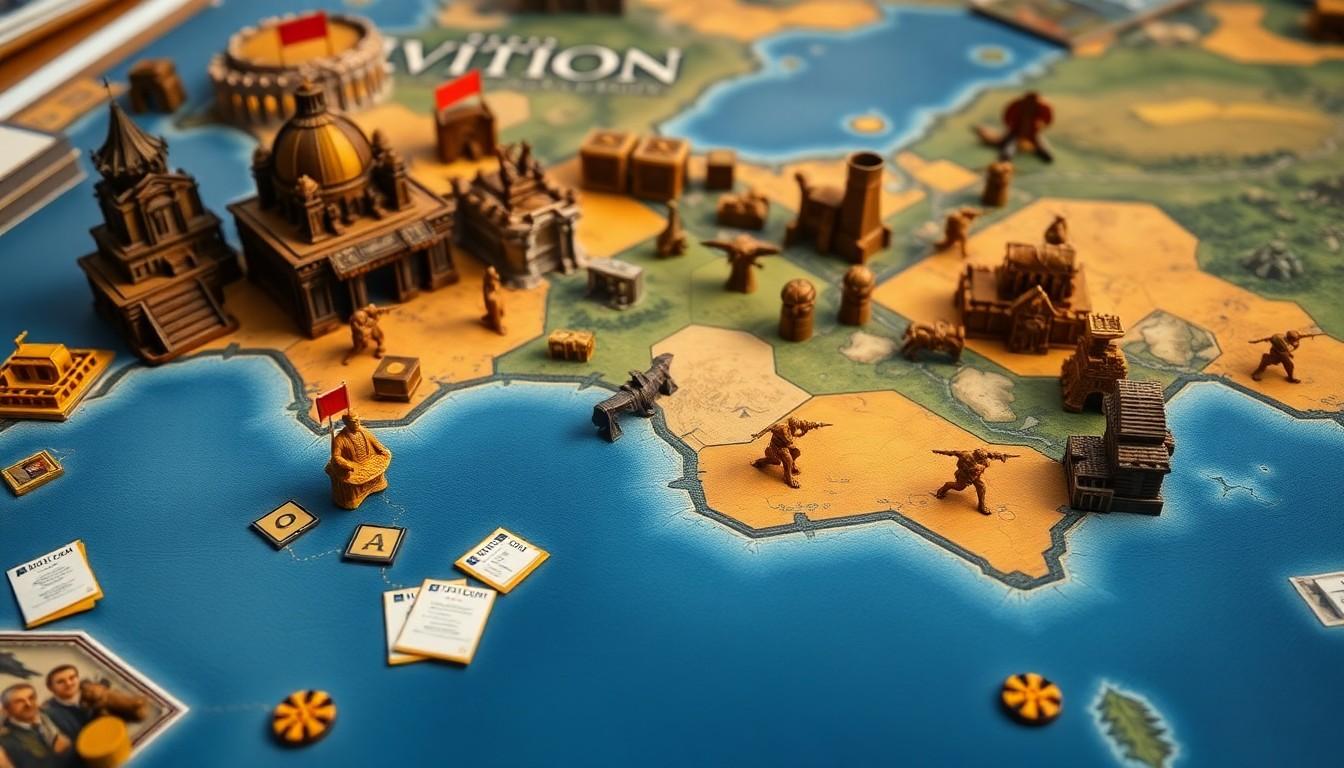In the world of strategy gaming, few titles capture the imagination quite like Civilization VI. Picture this: you’re leading a civilization from the Stone Age to the Space Age, all while trying not to accidentally declare war on your neighbor because they borrowed your lawnmower. With its intricate gameplay and endless possibilities, Civilization VI offers players the chance to build empires, forge alliances, and occasionally engage in backstabbing diplomacy worthy of a soap opera.
Civilization 6 Gameplay
Civilization VI offers players a rich strategy experience. Players develop their chosen civilization through distinct eras, utilizing resources and technology effectively. Building cities, expanding territories, and managing resources are core gameplay mechanics. They face challenges like maintaining cultural influence and conducting diplomacy with other civilizations.
Combat plays a significant role in gameplay. Players can engage in tactical battles with a range of military units, including melee, ranged, and siege units. Each unit type has unique strengths and weaknesses, encouraging strategic planning. Players often need to adapt their strategies based on the terrain and their opponents’ actions.
Diplomacy adds depth to the game. Forming alliances can lead to mutual benefits, like trade agreements and military support. Navigating political relationships requires careful management, as alliances can change quickly. They must balance diplomacy with military readiness to protect their interests.
Technology advancement drives progress. Players research technologies to unlock new units, buildings, and government policies. Choosing a technology path affects a civilization’s strengths and development trajectory. Each player’s choices lead to unique outcomes, enhancing replayability.
Culture and religion hold importance in shaping civilization identity. Players can develop cultural policies to influence societal development. Launching religious missions helps spread faith, impacting other civilizations and altering gameplay dynamics. Powerful cultural and religious influences can lead to significant advantages, making these elements crucial in strategic planning.
Balancing these diverse aspects results in engaging gameplay that keeps players invested in their civilizations’ successes and failures.
Game Mechanics

Civilization VI features intricate game mechanics that enhance the strategic experience. Players engage in turn-based strategy, manage resources, and navigate diplomatic options. These elements create a dynamic gameplay environment.
Turn-Based Strategy
Turn-based strategy defines the gameplay flow in Civilization VI. Every player takes turns executing actions, which allows for thoughtful decision-making. Players must balance their military, economic, and cultural pursuits. Each turn presents opportunities to expand territory, engage in combat, or develop science. Tactical challenges arise throughout the game, requiring players to adapt strategies based on opponents’ actions. This mechanic fosters a layer of depth, as each choice impacts future turns.
Resource Management
Resource management is crucial for civilization growth. Players gather and utilize various resources, such as food, production, and gold. Effective use of these resources drives city development and unit production. Players face challenges like scarcity and competition for resources. Maintaining a balance between resource allocation and city expansion influences overall success. Building improvements and trading with other civilizations enhances resource intake. The decisions made regarding resources significantly affect gameplay strategies.
Diplomatic Options
Diplomatic options enrich gameplay by allowing players to form alliances and negotiate treaties. Alliances provide benefits like shared resources and military support. Players can engage in various diplomatic actions, including trade agreements and cultural exchanges. Diplomatic relationships often shift based on actions taken, creating a need for players to remain vigilant. Managing these relationships affects strategy and can lead to war or peace. Balancing diplomacy with military readiness becomes essential as players navigate their civilizations’ needs and goals.
Civilizations and Leaders
Civilization VI features a diverse array of civilizations and leaders, each bringing unique gameplay elements. Every civilization possesses distinct traits and abilities that can significantly influence strategy.
Unique Traits and Abilities
Unique traits and abilities define each civilization in powerful ways. For instance, Rome’s “All Roads Lead to Rome” ability enhances city connections, allowing faster expansion and resource acquisition. Mali features unique abilities geared towards gold production and trade, fostering a strong economy. Similarly, the Mongols benefit from their cavalry-focused strengths, enabling rapid movement across territory. Leaders also contribute unique agendas, shaping diplomatic interactions. For example, Qin Shi Huang prioritizes monument building and infrastructure, encouraging players to expand culturally. Such attributes enrich gameplay, making strategic choices central to victory.
Strategic Advantages
Strategic advantages arise from civilization choices and leader traits. Civilizations like Greece provide culture bonuses, enabling quicker access to government policies. This advantage can lead to an early cultural lead, enhancing diplomatic options. In contrast, Russia’s increased territory allows for more resources through enhanced land claims. Different leader abilities also amplify specific gameplay strategies. For instance, Cleopatra excels in trade diplomacy, attracting allies and generating bonuses through trade routes. Players benefit from these advantages, positioning themselves for success in competitive situations. This complexity ensures that no two gameplay experiences are alike, encouraging exploration of varied civilizations and their strengths.
Gameplay Modes
Civilization VI offers diverse gameplay modes that enhance the overall gaming experience, providing both single-player and multiplayer options.
Single-Player Experience
Single-player mode immerses players in a world where they create and expand their civilization alone. Each game starts with the choice of a leader and civilization, reflecting unique abilities that influence strategy. Players must navigate through various challenges, including diplomatic relations and technological advancements. As the game progresses, they can set victory conditions such as domination, culture, or science. Achieving these goals requires careful planning and resource management, making the single-player experience both rewarding and challenging.
Multiplayer Options
Multiplayer mode connects players from around the globe, enriching interactions through alliances and competition. Participants can join matches with friends or strangers, engaging in cooperative or adversarial gameplay. This mode encourages real-time decision-making and negotiation, adding a dynamic layer to the strategy. Various formats exist, from casual games to ranked matches, catering to different skill levels. Players face unique challenges while managing their civilizations, requiring adaptability and keen awareness of opponents’ strategies. Engaging with others leads to a more immersive experience in Civilization VI.
Tips for Successful Gameplay
Effective strategies are essential for success in Civilization VI. Players can enhance their gameplay by following specific tactics in both early and late stages of the game.
Early Game Strategies
Prioritize settling cities near abundant resources. Focusing on food and production boosts growth and allows rapid development. Exploring the surrounding terrain reveals city locations and resource opportunities. Building scouts early aids in uncovering valuable terrain and neighboring civilizations. Utilize initial turns to strengthen military units for defense. This proactive approach protects against early attacks and secures vital resources. Forging early alliances benefits trade and diplomatic relations, helping gather information on opponents. Investing in technologies that unlock essential buildings is critical for establishing a strong foundation.
Late Game Strategies
In the late game, players should focus on technological advancement to unlock powerful units and buildings. Each turn becomes crucial as decisions directly impact the civilization’s capabilities. Expanding and fortifying borders prevents rival civilizations from encroaching. Engaging in diplomacy with multiple allies can provide strategic advantages, including military support and trade deals. Embracing cultural policies allows for increased influence and control over cities. Fulfilling victory conditions requires players to adapt their strategies based on the strengths and weaknesses of their opponents. Balancing military readiness with technological development plays a crucial role in achieving a dominant position on the world stage.
Civilization VI offers a captivating blend of strategy and depth that keeps players engaged from the Stone Age to the Space Age. The intricate mechanics of empire building diplomacy and resource management create a dynamic gaming experience. Each civilization’s unique traits and leaders add layers of strategy ensuring that every playthrough feels fresh and challenging.
With diverse gameplay modes players can choose between solo adventures or competitive multiplayer sessions. This flexibility caters to various preferences and skill levels enhancing the overall enjoyment. Whether focusing on military might or cultural dominance success hinges on thoughtful planning and adaptability.
Ultimately Civilization VI stands out as a rich strategic experience that encourages players to explore different approaches and civilizations making each game a unique journey.

